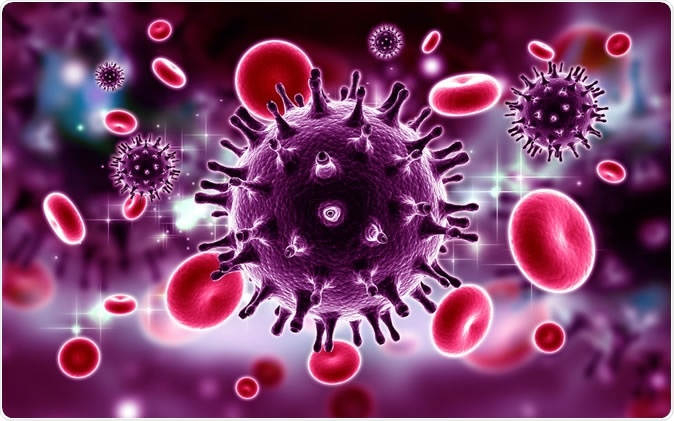A new study using DNA-based and protein HIV vaccines in various combinations shows that antibody and cellular immune response occurs within 6 weeks from the date of vaccination, and the combination must be administered together for the most rapid protection. This will enable more large-scale testing of the vaccine for effectiveness. About 40 million people today have HIV infections, and 1.2 million deaths a year are related to this infection.
The early phase trial was published in the Journal of Clinical Investigation on September 30, 2019. The vaccines tested the DNA-HIV-PT123 vaccine and the protein AIDSVAC® B/E vaccine. Different combinations of these were administered to four groups of patients being treated for HIV infection.
The trial, named HVTN 105, was performed by the HIV Vaccine Trials Network (HVTN). It was meant to advance the results obtained from the first vaccine trial to demonstrate any benefit from an HIV vaccine, the RV144/Thai trial conducted by the US Army.

3d rendered HIV Virus - Illustration Credit: RAJ CREATIONZS / Shutterstock
Earlier research
The RV144 trial tested a vaccine containing a viral vector modified with HIV gag, protease and env genes, along with a recombinant gp120 protein (a glycoprotein antigen on the HIV envelope - AIDSVAX B/E), at months 0, 1, 3 and 6. Earlier protein-based vaccines failed to protect against the infection. The RV144, however, produced a primarily antibody-based response with about 30% and 60% protection against the infection at 3 months and one year respectively. The presence of IgG2 antibodies against V1V2 region of the HIV envelope antigen gp120 were the most protective, and highest levels of this antibody were linked to a vaccine efficacy of over 60%. On the other hand, IgA levels were correlated with the risk of infection, perhaps because they prevent antibodies from recognizing antigens via their Fc domains. The presence of antibody-dependent cellular cytotoxicity (ADCC) and a low IgA titer is linked to reduced risk of infection.
New directions in the current study
HVTN 105 was meant to investigate the benefit of a vaccine priming dose to enhance the benefits of the RV144 trial. The ALVAC viral vector was replaced by a DNA plasmid vaccine with the same genes but a different envelope antigen. The DNA plasmid offers several improvements compared to the ALVAC vector. DNA vaccines are more heat stable, easier to manufacture, and more versatile in that they can be manufactured to contain different combinations of the HIV virus with or without adjuvants. Their safety profile in other vector vaccines has also been proved.
This combination of HIV DNA and protein vaccine has been tested in two small trials showing significant antibody and cellular immune responses. The current study is unique in showing the results of priming with a protein and using a DNA vaccine as a booster, and of using four doses of DNA vaccine, as well as being among the few trials to test the effects of giving these two products together from the first dose onwards.
The study
It included 104 patients who were not likely to be infected with HIV. The median age was 27 years, and 53% were male. They were randomly assigned one of four treatment groups. All were vaccinated intramuscularly at 0, 1, 3 and 6 months. T1 received protein vaccine during the first two doses followed by DNA boosters for the next two doses. T2 received the doses in reverse order. The T3 group received HIV DNA for priming at months 0 and 1, with DNA and protein administered together as vaccine boosters for the next two doses. In T4, the two were given together for all four doses.
The outcome
The vaccines were generally safe and tolerated well. In all four groups, 80% to 100% of participants responded 2 weeks after the second dose of the protein vaccine. The highest response was in both T3 and T4 groups, where 95% to 100% of participants showed the production of antibodies against gp120, as well as V1V2. All the participants also showed T cell responses. The production of ADCC and neutralizing antibodies in response to the vaccine was seen at highest levels in T3 and T4 respectively. The immune response was suboptimal when priming was done using the protein vaccine followed by DNA boosting. DNA priming with protein booster produced an immune response but below that achieved by the administration of DNA and protein together.
The highest IgG3 production was seen in T3. The ratio of IgA to IgG with the T4 regimen was lower than with T3, and this is associated with a reduced risk of adverse effects. IgG4 production was unexpectedly high in the T4 group, a finding which requires more work to understand. CD4+ T cells were equally induced across all groups, but not CD8+ cells.
The importance of the study is its demonstration of more potent induction of immunity by the coadministration of DNA with protein vaccine, compared to the moderate responses already seen in RV144. The presence of antibody and cellular responses to vaccination will help the vaccine to be tested on larger numbers of people in order to find its actual efficacy rate.